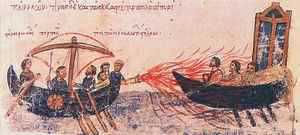Articles >>
Greek fire
Category: Term of the day

Greek fire was a burning-liquid weapon used by the Byzantine Greeks, Chinese, Mongols, and Arabs. The Byzantines typically used it in naval battles to great effect as it could continue burning even on water. The Greek fire was largely responsible for many Byzantine military victories, and partly the reason for the Byzantine Empire surviving as long as it did. The formula was a secret and remains a mystery to this day. As one contemporary victim of Greek fire advised his comrades, 'Every time they hurl the fire at us, we go down on our elbows and knees, and beseech Our Lord to save us from this danger'.
The ingredients, process of manufacture, and usage were a very carefully guarded military secretŚso secretive that it remains a source of speculation to this day. Speculations nclude:
It is not clear if the operator ignited the mixture with a flame as it emerged from the syringe, or if it ignited spontaneously on contact with water or air. If the latter is the case, it is possible that the active ingredient was calcium phosphide, made by heating lime, bones, and charcoal. On contact with water, calcium phosphide releases phosphine, which ignites spontaneously. The reaction of quicklime with water also creates enough heat to ignite hydrocarbons, especially if an oxidizer such as saltpeter is present. However, Greek fire was also used on land.
These ingredients were apparently heated in a cauldron, and then pumped out through a siphon or large syringe (known as a siph˛nari˛s) mounted on the bow of the ship. Such a ship was herself called a siph˛n˛ph˛r˛s. It could also be used in hand grenades, made of earthenware vessels. If a pyrophoric reaction was involved, perhaps these grenades contained chambers for the fluids, which mixed and ignited when the vessel broke on impact with the target. |
Bombard
08.10.2007
Discuss
